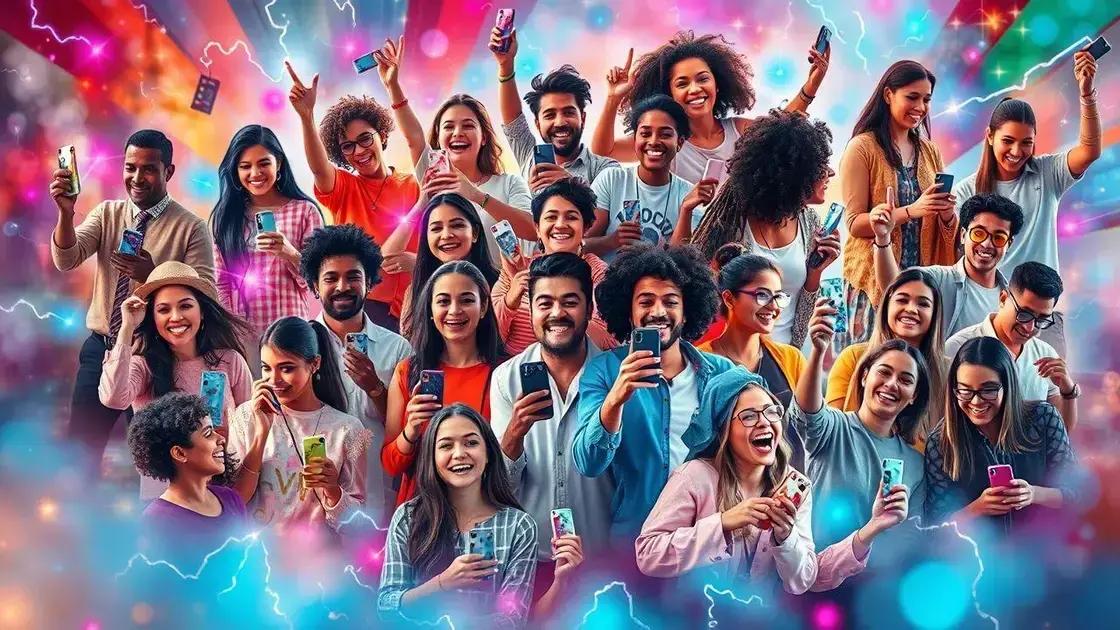2025 in marketing: 6 trends you need to know

The rise of influencer marketing in 2025 is transforming brand-consumer relationships by emphasizing authenticity, personal connections, and effective engagement through trusted voices across various digital platforms.
2025 in marketing is set to unveil some exciting trends that could reshape our approach to reaching customers. Have you ever wondered how these changes might influence your strategy? Buckle up as we explore the future of marketing together!
Understanding the evolving digital landscape
Understanding the evolving digital landscape is crucial for marketers looking to stay ahead. Today, technology evolves rapidly, shaping the way we connect and engage with consumers.
One significant aspect to consider is the rise of mobile usage. Most users are accessing content through their smartphones, making mobile optimization a necessity. To keep up, businesses must ensure their websites and marketing strategies are tailored for mobile devices.
Key Trends in Digital Marketing
Several trends influence the digital marketing landscape. These include:
- Personalization: Consumers expect tailored experiences based on their preferences.
- Video Content: Engaging videos can enhance user experience and increase conversion rates.
- Social Media Growth: Platforms like TikTok and Instagram shape brand visibility and engagement.
These factors contribute to a significant shift in how consumers receive information. As technology advances, new tools emerge, enabling marketers to reach their target audience more effectively. Augmented reality and artificial intelligence are becoming essential in crafting engaging experiences.
Moreover, understanding data analytics is vital. By analyzing consumer behavior, businesses can adjust their strategies to meet demands effectively. Utilizing real-time data allows for rapid response to market changes.
A collaborative approach is also essential. Marketers must work closely with IT and development teams to ensure that digital tools function optimally and deliver the intended user experience. Aligning these efforts can enhance overall effectiveness.
As we continue to explore the digital landscape, remember that adaptability is key. Staying informed about emerging trends will help you navigate changes and maintain relevance in the market.
The rise of influencer marketing in 2025

The rise of influencer marketing in 2025 is reshaping how brands connect with their audiences. As consumers become more skeptical of traditional advertising, they turn to trusted voices within their communities for recommendations.
This shift highlights the power of authenticity. Influencers relate genuine experiences with products, making their endorsements feel more trustworthy. This connection between influencers and their followers boosts engagement, leading to effective marketing strategies.
Factors Driving Influencer Marketing Growth
Several factors contribute to the growth of influencer marketing:
- Social Media Evolution: Platforms are continuously evolving, allowing influencers to reach wider and more diverse audiences.
- Consumer Trust: Followers are more likely to trust recommendations from someone they consider relatable.
- Video Content Popularity: Short-form videos on platforms like TikTok enhance the visibility of influencer messages.
Moreover, the diversity of influencers allows brands to target niche markets effectively. Micro-influencers, for example, often boast higher engagement rates than their larger counterparts. As followers feel a deeper personal connection to micro-influencers, brands benefit from a more engaged audience.
In addition, analytics tools are becoming crucial for planning influencer campaigns. Measuring performance helps businesses adjust their strategies in real-time. Tracking metrics such as engagement rates, conversions, and audience growth enables brands to refine their focus on the most effective partnerships.
Another significant trend is the rise of brand collaborations with influencers. These partnerships foster creativity and shared storytelling, enhancing brand visibility. Companies are starting to see influencers as vital marketing partners rather than just promotional tools.
As we look towards 2025, the landscape of influencer marketing will continue to evolve. Staying updated on industry trends is essential for brands to maximize their impact in this dynamic environment.
How AI is transforming consumer engagement
How AI is transforming consumer engagement is a fascinating development in marketing today. Technology is rapidly changing the way brands interact with their customers, making engagement more dynamic and personalized.
One key aspect of this transformation is the use of AI-driven chatbots. These chatbots can offer real-time assistance, answering questions and solving problems around the clock. This contributes to a better customer experience by providing instant support.
Benefits of AI in Consumer Engagement
AI offers several benefits that enhance how businesses connect with their audience:
- Personalized Recommendations: AI analyzes user behavior to suggest products tailored to individual preferences.
- Predictive Analytics: Businesses can predict trends and consumer needs, allowing for proactive engagement strategies.
- Improved Customer Insights: AI gathers valuable data, helping brands understand their audience better.
Moreover, AI enables brands to create targeted marketing campaigns. By leveraging data analytics, companies can reach users with content that resonates. This level of personalization helps build stronger relationships and increases brand loyalty.
In addition, AI technology, such as machine learning, continuously improves engagement strategies. It learns from user interactions to optimize future recommendations, ensuring content remains relevant and appealing. As consumers respond positively, brands see increased conversion rates and more meaningful interactions.
As businesses adopt AI technologies, they must also focus on maintaining a human touch. While automation enhances efficiency, genuine connections remain essential. Balancing AI’s efficiency with personal engagement is vital for sustained success.
As we move forward, the impact of AI on consumer engagement will continue to grow. Staying updated with these advancements will be crucial for brands aiming to thrive in an evolving marketplace.
Sustainability trends in marketing strategies

Sustainability trends in marketing strategies have become increasingly important in today’s business environment. Companies are realizing that consumers are more likely to support brands that prioritize sustainability and eco-friendly practices.
The shift toward green marketing emphasizes transparency and responsibility. Brands that showcase their sustainable efforts often see a positive boost in brand loyalty and customer trust. This focus on promoting ethical practices is crucial as consumers demand more from the companies they purchase from.
Key Sustainability Trends
Several trends are shaping how businesses approach marketing through a sustainability lens:
- Eco-friendly Products: More brands are developing products made from sustainable materials or that promote energy efficiency.
- Zero Waste Initiatives: Companies are implementing strategies to reduce waste in packaging and production.
- Transparency in Supply Chains: Customers want to know where their products come from and the processes involved in creating them.
In addition, businesses are leveraging social media to communicate their sustainability messages. Engaging stories about eco-friendly practices can resonate deeply with audiences. Creating genuine connections helps nurture a community around shared values.
Another factor to consider is the role of partnerships. Collaborating with environmental organizations or influencers can amplify a brand’s commitment to sustainability. These partnerships enhance credibility and can lead to innovative marketing campaigns that capture consumer attention.
As we continue to incorporate sustainability into marketing strategies, adapting to emerging trends will be essential. Staying informed about consumer preferences and industry developments ensures that brands remain competitive while making a positive impact on the environment.
In conclusion, the evolving landscape of marketing emphasizes the importance of sustainability and the integration of AI to enhance consumer engagement. As brands adapt to these trends, they will build stronger connections with their audience while making positive impacts on the environment. By embracing these changes, companies can thrive in the competitive market and foster loyalty among their customers.
FAQ – Frequently Asked Questions about Sustainability and AI in Marketing
How is sustainability impacting marketing strategies today?
Sustainability is driving brands to adopt eco-friendly practices and transparency, influencing consumer choices and loyalty.
What role does AI play in consumer engagement?
AI enhances consumer engagement by personalizing experiences and providing real-time customer support.
Why should brands focus on building brand loyalty?
Brand loyalty leads to repeat customers, higher sales, and a strong community that supports the brand’s values.
How can companies communicate their sustainability efforts effectively?
Companies can share stories about their sustainable practices on social media and through marketing campaigns to connect with eco-conscious consumers.





